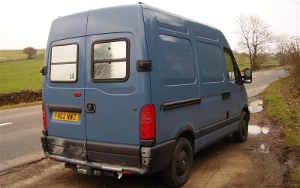New Speed Camera Vans

Private and motor trade drivers of new and used vehicles are being cautioned about the potential deployment of new “stealth” speed camera vans, which may be introduced nationwide in the near future.
Unlike traditional police vans that are easily identifiable on roads and laybys, these new vehicles are matt grey and more difficult for drivers to recognize.
Speeding is a significant factor in road accidents and fatalities, and the implementation of these unmarked vans aims to reduce these statistics.
Northamptonshire Police are currently testing these vans, and if successful, the police will wrap their current fleet of speed vans in matte grey colour and roll them out nationally.
Alerting drivers about upcoming speed cameras is not mandatory for either local officers or councils, providing police departments with the flexibility to introduce this change.
The switch to grey vans is intended to discourage drivers from slowing down for the police van and then exceeding the speed limit once it is out of sight.
Road Angel, a car-tech company, believes that this move could positively alter driver behaviour. The announcement of the trial comes after news of a new app that could turn any vehicle into a speed camera, highlighting the increasing issue of speeding in the UK.
Mr Digva, Road Angel’s Founder, commented: “Introducing these undercover mobile speed camera vans is a positive step forward in reducing the amount of speeding drivers on UK roads.
Motorists should be aware that other police forces across the country, too, could be rolling out these covert camera vans and should watch their speed wherever they travel.
The safest way to drive is to assume that every van you see on the road is carrying a speed camera – then you’ll never break the limit, avoid fines, and stay safe.”
“For motorists that need that extra bit of help keeping within the limit there is technology available that provides drivers with key speed information and safety alerts.”
“Although there is certainly still a long way to go to stop speeding vehicles and the number of fatalities and injuries it causes, I hope that deploying these vans will mean motorists will think twice before putting their foot down. Not only will you be slapped with a hefty fine and points on your licence, you’re also seriously putting your own and other road users’ lives seriously in danger.”
To ensure the safety of all road users and avoid expensive increases to your private or motor trade insurance policy, it is important to obey traffic laws and never exceed the speed limit, if you do, and are found guilty, it is important to notify your local insurance broker.
If you receive a speeding ticket that you believe was issued unfairly, you can appeal it by completing the relevant section of the Notice of Intended Prosecution (NIP) within 28 days.
However, it is crucial to consider whether you have legitimate grounds for dispute, as an unsuccessful appeal could result in a higher fine or a court appearance.
Technicalities such as incorrect or missing details on the NIP, obscured road signs, or incorrect identification of the driver may be valid grounds for appeal. If you believe you were not speeding, you may need to go to court to challenge the speeding ticket and request the calibration certificate for the speed camera.
It is essential to avoid using excuses like not knowing the speed limit or being in a hurry, as these are unlikely to be successful in court. Instead, showing remorse and outlining mitigating factors may result in a more lenient penalty.
If you decide to dispute the speeding fine, you can attend the hearing in person or argue your case in writing, explaining the reasons for your mistake and the consequences of losing your license.
In addition, the government are monitoring the trial of a new scheme introduced back in October 2022, road noise cameras tracking drivers who break the law by excessively revving their engines and using modified exhausts.
The pilot areas for the scheme were Bradford, South Gloucestershire, Great Yarmouth, and Birmingham.







